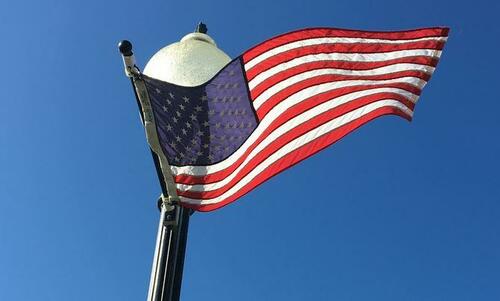
Authored by Maggie Miller via RealClearFlorida,
In the heart of Riviera Beach, Florida, a company called K12 Print is redefining what it means to do business in America. This isn’t just about profits and productivity for John DiDonato, the CEO and founder. While financial success is part of the equation, his deeper mission is to help revive a vital cornerstone of the American economy: manufacturing. DiDonato’s vision for K12 Print is rooted in the belief that manufacturing can be a catalyst for change—not just for the company, but for the country and its communities.
There is an ongoing conversation surrounding onshoring, especially following COVID when the global supply chain was disrupted. Businesses are considering it, but don’t see the way forward. K12 Print knows the way, and it is done through investing in human capital.
“You shouldn’t overlook an enterprise zone,” DiDonato advises. “Yes, for the tax benefits you may find, but mostly for the community you will find there—a community hungry for opportunity.”
Setting up shop in an enterprise zone wasn't just a business decision for DiDonato; it was a strategic move to breathe new life into American manufacturing and, by extension, into the local community of Riviera Beach. He saw potential in establishing a manufacturing base where it was most needed, offering jobs and training to local residents, and revitalizing the local economy.
“I thought as the company grew, it could actually change the city,” DiDonato reflects.
For DiDonato, the decline in American manufacturing isn't just an economic issue; it's a societal one. He believes that the offshoring of manufacturing jobs has eroded the foundation of the American middle class and limited opportunities for many young people, particularly those in inner cities. According to DiDonato, manufacturing is crucial for creating wealth and maintaining a healthy economy.
“Manufacturing is the only thing that creates wealth,” he says. “In order to have a healthy economy, you need a strong manufacturing base. We’ve outsourced so much of our manufacturing that it’s affecting our economy and the opportunities available to our young people, especially in inner cities.”
DiDonato points to countries like China, which have focused heavily on manufacturing and trade skills, resulting in rapid economic growth and job opportunities. The U.S., on the other hand, has seen a decline in its manufacturing sector. According to the U.S. Joint Economic Committee, since January 2000, the United States has lost over a quarter of all domestic manufacturing jobs, a decline of over 4.7 million. DiDonato believes this is a major factor in the economic challenges faced by many American communities today.
“When I was a young man in manufacturing, I learned how to make things by making them. That’s not something you can teach in a classroom,” DiDonato explains. “If we keep offshoring our manufacturing, not only do the jobs go, but the technology and innovation follow. We need to bring manufacturing back to America so our kids can be at the forefront of creating and building new things.”
K12 Print’s business philosophy is rooted in a passion for redemption and an understanding that mistakes are a part of life. DiDonato’s co-owner, Jim Wahlberg, has personally felt the effects of redemption and looks for ways to offer the same to others. He said, “We are all subject to redemption. It takes the love and mercy of others and the resolve to do whatever it takes to continue to push forward.”
“There are bad circumstances, but there aren't bad children. The majority of our kids in America are good kids that just need to be given an opportunity,” DiDonato said.
DiDonato believes there’s a valuable place for hands-on skills in the modern economy. While businesses across the country have struggled to fill vacancies, K12 Print has found success by thinking outside the box. According to DiDonato, the key lies in offering practical training that prepares employees for the demands of manufacturing work, regardless of their educational background.
This inclusive hiring approach extends to individuals with past mistakes on their records. DiDonato believes in giving people who have served their time a second chance to rebuild their lives. He doesn’t believe the consequences of past mistakes should follow someone forever, provided they’re willing to work hard and seize the opportunities given to them.
Angel Peña, a longtime employee of K12 Print, is a testament to this philosophy. For Peña, K12 Print has been more than just a job—it’s been a second chance at life. “I was a stubborn kid, grew up in the foster system, and made bad decisions,” says Peña. “A lot of people closed doors on me because I was a convicted felon. But K12 Print looked at me as a person, not just my past. They gave me hope and a future.”
There are many ways to invest in the community. And K12 Print believes that investment should go further than the current workforce. K12 Print is committed to breaking the cycle of poverty by investing in underserved youth. DiDonato takes a portion of the company’s profits and redirects them into local initiatives, such as the Boys and Girls Club, providing transportation and technology resources to help children in the community. This investment is part of his broader strategy to create a more inclusive and supportive environment for future generations.
“By investing back into the community, we’re not just helping individuals; we’re helping to build a more successful and peaceful society,” DiDonato explains. “If we can reach more executives who think, ‘We can do that too,’ we can start to make a real difference. It’s important for our leaders to understand that kids, especially those in inner cities, aren’t bad—they just need opportunities and people who care.”
DiDonato’s vision for K12 Print is one of hope and practical action. By setting up his business in Riviera Beach and focusing on local talent, he’s not just making it work in America—he’s making it matter. This is what it means to be Made in America.
Maggie Miller is a Real Clear contributor. Maggie is a former news anchor and reporter in New York and Alabama. She is a graduate of the University of Florida.
Authored by Maggie Miller via RealClearFlorida,
In the heart of Riviera Beach, Florida, a company called K12 Print is redefining what it means to do business in America. This isn’t just about profits and productivity for John DiDonato, the CEO and founder. While financial success is part of the equation, his deeper mission is to help revive a vital cornerstone of the American economy: manufacturing. DiDonato’s vision for K12 Print is rooted in the belief that manufacturing can be a catalyst for change—not just for the company, but for the country and its communities.
There is an ongoing conversation surrounding onshoring, especially following COVID when the global supply chain was disrupted. Businesses are considering it, but don’t see the way forward. K12 Print knows the way, and it is done through investing in human capital.
“You shouldn’t overlook an enterprise zone,” DiDonato advises. “Yes, for the tax benefits you may find, but mostly for the community you will find there—a community hungry for opportunity.”
Setting up shop in an enterprise zone wasn’t just a business decision for DiDonato; it was a strategic move to breathe new life into American manufacturing and, by extension, into the local community of Riviera Beach. He saw potential in establishing a manufacturing base where it was most needed, offering jobs and training to local residents, and revitalizing the local economy.
“I thought as the company grew, it could actually change the city,” DiDonato reflects.
For DiDonato, the decline in American manufacturing isn’t just an economic issue; it’s a societal one. He believes that the offshoring of manufacturing jobs has eroded the foundation of the American middle class and limited opportunities for many young people, particularly those in inner cities. According to DiDonato, manufacturing is crucial for creating wealth and maintaining a healthy economy.
“Manufacturing is the only thing that creates wealth,” he says. “In order to have a healthy economy, you need a strong manufacturing base. We’ve outsourced so much of our manufacturing that it’s affecting our economy and the opportunities available to our young people, especially in inner cities.”
DiDonato points to countries like China, which have focused heavily on manufacturing and trade skills, resulting in rapid economic growth and job opportunities. The U.S., on the other hand, has seen a decline in its manufacturing sector. According to the U.S. Joint Economic Committee, since January 2000, the United States has lost over a quarter of all domestic manufacturing jobs, a decline of over 4.7 million. DiDonato believes this is a major factor in the economic challenges faced by many American communities today.
“When I was a young man in manufacturing, I learned how to make things by making them. That’s not something you can teach in a classroom,” DiDonato explains. “If we keep offshoring our manufacturing, not only do the jobs go, but the technology and innovation follow. We need to bring manufacturing back to America so our kids can be at the forefront of creating and building new things.”
K12 Print’s business philosophy is rooted in a passion for redemption and an understanding that mistakes are a part of life. DiDonato’s co-owner, Jim Wahlberg, has personally felt the effects of redemption and looks for ways to offer the same to others. He said, “We are all subject to redemption. It takes the love and mercy of others and the resolve to do whatever it takes to continue to push forward.”
“There are bad circumstances, but there aren’t bad children. The majority of our kids in America are good kids that just need to be given an opportunity,” DiDonato said.
DiDonato believes there’s a valuable place for hands-on skills in the modern economy. While businesses across the country have struggled to fill vacancies, K12 Print has found success by thinking outside the box. According to DiDonato, the key lies in offering practical training that prepares employees for the demands of manufacturing work, regardless of their educational background.
This inclusive hiring approach extends to individuals with past mistakes on their records. DiDonato believes in giving people who have served their time a second chance to rebuild their lives. He doesn’t believe the consequences of past mistakes should follow someone forever, provided they’re willing to work hard and seize the opportunities given to them.
Angel Peña, a longtime employee of K12 Print, is a testament to this philosophy. For Peña, K12 Print has been more than just a job—it’s been a second chance at life. “I was a stubborn kid, grew up in the foster system, and made bad decisions,” says Peña. “A lot of people closed doors on me because I was a convicted felon. But K12 Print looked at me as a person, not just my past. They gave me hope and a future.”
There are many ways to invest in the community. And K12 Print believes that investment should go further than the current workforce. K12 Print is committed to breaking the cycle of poverty by investing in underserved youth. DiDonato takes a portion of the company’s profits and redirects them into local initiatives, such as the Boys and Girls Club, providing transportation and technology resources to help children in the community. This investment is part of his broader strategy to create a more inclusive and supportive environment for future generations.
“By investing back into the community, we’re not just helping individuals; we’re helping to build a more successful and peaceful society,” DiDonato explains. “If we can reach more executives who think, ‘We can do that too,’ we can start to make a real difference. It’s important for our leaders to understand that kids, especially those in inner cities, aren’t bad—they just need opportunities and people who care.”
DiDonato’s vision for K12 Print is one of hope and practical action. By setting up his business in Riviera Beach and focusing on local talent, he’s not just making it work in America—he’s making it matter. This is what it means to be Made in America.
Maggie Miller is a Real Clear contributor. Maggie is a former news anchor and reporter in New York and Alabama. She is a graduate of the University of Florida.
Loading…






